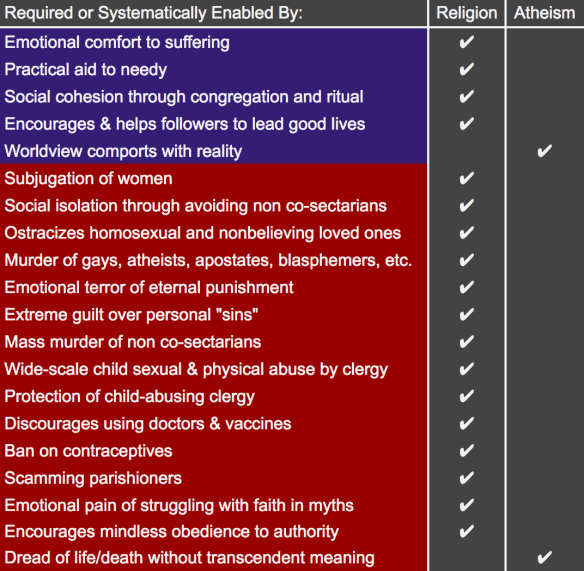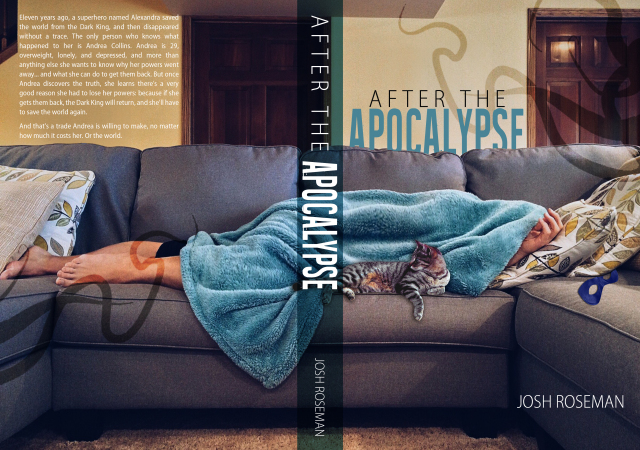Scott Simon is one of the most affable interviewers employed by NPR, but there is a tone he takes with atheists that fathers normally reserve for the first dinner with a daughter’s ostentatiously tattooed jobless older boyfriend. He clearly believes atheism is a threat to society regardless of whether or not God exists.
Saturday’s interview with Richard Dawkins is a shining example. Simon has a history of disrespecting atheist interviewees, but this was the most rude I’ve ever heard him be. He was driven to ask a particular question, one he has asked many times before, and one he apparently believes is a checkmate in the rhetorical battle against atheists. It was delivered in an unusually awkward, almost Trump-like syntax:
I want to – look, I respect atheists and atheism. But I want to pick up a nice argument we used to have every couple of years with Christopher Hitchens, your friend. And that’s – you can respect atheism. I’ve covered a lot of wars, famines and tragedies. And it seems to me, truly, every theater of suffering I’ve ever been to, there is a dauntless nun, priest, clergy or religious person who was working very selflessly and bravely there for the good of human beings. And I don’t run into organized groups of atheists who do this.
Simon was so intent on this question that he mostly disregarded Dawkins’ replies in order to ask it again, and yet a third time. He even clearly implies that atheists are unpleasant know-it-alls:
But I do wonder, am I just not seeing the world correctly to see large numbers of well-motivated atheist(sic) lending their lives to trying to better the world? Or they’re – if I might put it this way, are they more concerned about just being right intellectually?
I think Dawkins acquitted himself well, but I’d like to give my own responses to this strident question, some of which will amplify his.
Simon’s question incorrectly assumes atheism is comparable to religion.Plato recounts a man who asks Socrates how to find the best teacher of warrior skills for his son. Socrates replies “Is there not a prior question?” In Socrates’ case the prior question was complex and meant to enlighten the listener about the nature of knowledge and what knowledge is worth pursuing.
In Simon’s case there us a simpler prior question: “Why would atheism organize into large-scale atheist-themed charity organizations?”
Like many NPR staffers Simon misapprehends what atheism is, and, more to the point, what it isn’t. It is not anything like religion. It is simply the lack of religion. As Penn Gillette once said, “atheism is a religion like not stamp-collecting is a hobby.” To be slightly more accurate, atheism is a religion like not having any hobby is a hobby. Atheism is a lack of churches, of theology, of clergy. Atheism represents a simplification of one’s worldview to omit irrational beliefs in gods, angels, demons and miracles.
Asking why atheists don’t create massive, atheist-themed global charity organizations to deploy dauntless atheists to every theater of suffering is totally absurd. Churches are organizations of people joined together by a common set of beliefs. It’s hard to imagine a lot of organizations joined together by a common lack of belief. Yes, there are atheist organizations, but mostly because atheists are a reviled minority, including by Mr. Simon. The day atheism becomes common and accepted is the day those organizations mostly disappear.
Secular organizations provide the counter-examples Simon is seeking.Simon admits that secular organizations and individual atheists do good in the world, but refuses to allow those to substitute for the atheist organizations he apparently thinks should exist.
When people lack religious belief and therefore the desire to act as a member of a church they organize around other more specific goals and causes that they care about, such as providing clean water or medical care to villages in the developing world, including in disaster-ravaged and war-torn areas. The secular organization Medecins Sans Frontieres (MSF) is a perfect example of this. MSF is made up of doctors, many of them from Europe. Statistically it is a certainty that many/most of them are atheists. They perform some of the hardest and most needed acts of bravery in theaters of suffering around the world. UNICEF is another large-scale example. One can argue that secular organizations do a better job than religious ones because they don’t waste precious energy and resources on the evangelical goals that both motivate and distract missionaries.
These organizations demonstrate that, in the unlikely event atheism takes hold across the world, Simon need not worry the theaters of suffering will be emptied of well-meaning helpers.
Religions are problematic in ways atheism is not.Most of what religious organizations do is in places other than theaters of suffering. And much of what religions teach (and require) is not about helping others. Almost half of the Ten Commandments are not about behavior but instead are about worshipping Jehovah. Religion is characterized by everything it requires of its believers, and everything that its organizations enable. This includes the good and the bad. Many wish to define religion as only the positive things done for religious reasons. For example with this statement from the Dawkins interview Simon even implies there’s an argument to be made that religion plays no role in terrorism:
You’ve been outspoken and unbowed in your beliefs that religion plays a role in terrorism.
This idea is absurd, but better minds than mine have thoroughly debunked it elsewhere.
Whether or not you believe Religion is a major cause of terrorism, it certainly inspires many horrible outcomes ranging from tragically widespread alienation of gay kids from their fundamentalist religious families, to more spectacular sect-on-sect deadly violence that occurs weekly in places like Pakistan, Iraq, and Egypt.
To make this crystal clear I’ve created a chart showing some of the good and bad things that are demanded by or systematically enabled by religion and atheism:

Atheism wins handily because it requires nothing – good or bad – of atheists. You might argue that some atheists also molest children, but they are not empowered by the fact that they are atheists. The shocking child abuse widespread within the Catholic Church was enabled, hidden, and ultimately protected by the respect required of congregants for their clergy and the political power of the church in communities.
By contrast, atheism has no doctrine, not even rationality. If you are an atheist for irrational reasons you are still an atheist. Atheists simply do not accept the truth claims about gods made by the religious. If an atheist organization is created and starts a youth group or meets every Sunday for discussions it’s not because atheist doctrine requires or encourages it. There’s even a group called “Atheism Plus” which admits by its very name that all of its principals and activities are additions to the simple base of atheism.
It’s also interesting that the World Happiness Report rates many of the most secular countries at the top. Here’s the summary for 2017:
Norway has jumped from 4th place in 2016 to 1st place this year, followed by Denmark, Iceland and Switzerland in a tightly packed bunch. All of the top four countries rank highly on all the main factors found to support happiness: caring, freedom, generosity, honesty, health, income and good governance.
And all without a single dauntless nun or priest! A world without religion is not as scary as Simon so often implies. It might even be quite a bit better.
Atheism is an undeserving target.Globally atheists are an oppressed minority. In America majorities in many states say they would never vote for an atheist running for public office. Atheists are killed and tortured in many countries on a regular basis, something that is woefully under-reported by NPR.
Sometimes journalists like Simon get confused into thinking criticizing atheism is “punching up,” as in afflicting the comfortable on behalf of those who piously comfort the afflicted. I believe they feel this way for a few reasons:
Given the real power of religion I’d much rather hear Simon & NPR punch up at, for example, nefarious and hypocritical self-proclaimed religious groups like “prosperity gospel” churches that are actively fleecing people while wearing the sheep’s clothing of righteousness.
Advertisements Share this:




